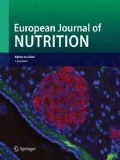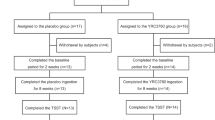Summary
Background
A suppressed immune response has been documented in students under examination stress.
Aims
The current study aimed to evaluate the effect of milk fermented with yogurt cultures plus Lactobacillus casei DN-114001 (Actimel®) on the immune system of subjects under academic examination stress.
Methods
University students were allocated to one of two groups, receiving during 6 weeks (3 weeks prior to, as well as the 3-week duration of the examination period) either: a) a glass of semi-skimmed milk each day (control group, n=63) or b) two 100mL portions per day of fermented milk (treatment group, n=73). Anxiety and immunological measurements were monitored at baseline (Phase 0) and study end (Phase 1).
Results
The results were expressed as the differences between the data obtained from Phase 0 and Phase 1. This was calculated by subtracting Phase 1 results from the Phase 0 and it is denominated “Treatment effect”. Mean (± SE) anxiety increased significantly (P<0.05) over the 6-week study in all students, from 40.74±2.50 to 61.19±2.64 (in percentiles). There was no significant treatment effect since this increase was similar in the control and the treatment groups (21.65±5.09 vs 19.14±3.67, respectively). However, there was a significant treatment effect (P<0.05) on the mean change in absolute number of lymphocytes during the 6-week study, which decreased in the control group (–0.04±0.12 cells x 103/mm3) and increased in the treatment group (0.37±0.11 cells x 103/mm3). There was also a significant treatment effect (P<0.05) on the change in absolute numbers of CD56 cells during the 6-week study. Mean absolute CD56 cells significantly decreased (P<0.05) in the control group (–51.97±21.33 cells/mm3),while remaining similar in the treatment group (17.29±17.27 cells/mm3). During the study, mean serum cortisol increased 4.30±0.98 µg/dL in the control group, and 1.75±1.05 µg/dL in the treatment group and no significant differences were found between both values (P=0.062).
Conclusions
Milk fermented with yogurt cultures plus Lactobacillus casei DN-114001 was able to modulate the number of lymphocytes and CD56 cells in subjects under academic examination stress.
Similar content being viewed by others
References
Biondi M, Zannino L-G (1997) Psychological stress, neuroimmunomodulation and susceptibility to infectious diseases in animals and man: a review. Psychother Psychosom 66:3–26
Spiegel D, Sephton SE, Terr AI, Stites DP (1998) Effects of psychosocial treatment in prolonging cancer survival may be mediated by neuroimmune pathways. Ann NY Acad Sci 840:674–683
Yang EV, Glaser R (2002) Stress induced immunomodulation and the implications for health. Int Immunopharmacol 2:315–324
Dobbin JP, Harth M, McCain GA, Martin RA, Cousin K (1991) Cytokine production and lymphocyte transformation during stress. Brain Behav Immunity 5:339–348
Maes M, Van Bockstaele DR, Van Gastel, A et al. (1999) The effects of psychological stress on leukocyte subset distribution in humans: evidence of immune activation. Neuropsychobiology 39:1–9
Kiecolt-Glaser JK, Garner W, Speicher CE, Penn GM, Holliday JE, Glaser R (1984) Psychosocial modifiers of immunocompetance in medical students. Psychosom Med 46:7–14
Guidi L, Tricerri A, Vangeli M, et al. (1999) Neuropeptide Y plasma levels and immunological changes during academic stress. Neuropsychobiology 40:188–195
Sarid O, Anson O, Yaari A, Margalith M (2001) Epstein-Barr virus specific salivary antibodies as related to stress caused by examinations. J Med Virol 64:149–156
Uchakin PN, Tobin B, Cubbage M, Marshall G, Sams C (2001) Immune responsiveness following academic stress in first-year medical students. J Interferon Cytokine Res 21:687–694
Kusnecov AW, Rabin BS (1994) Stressor-induced alterations of immune function: mechanisms and issues. Int Arch Allergy Immunol 105:107–121
Marcos A (2000) Eating disorders: a situation of malnutrition with peculiar changes in the immune system. Eur J Clin Nutr 54(Suppl 1):S61–S64
Paubert-Braquet M (1995) Enhancement of host resistance against Salmonella typhimurium in mice fed a diet supplemented with yogurt or milk fermented with various Lactobacillus casei strains. Int J Immunotherapy 11(4):153–161
Pedone CA, Arnaud CC, Postaire ER, Bouley CF, Reinert P (2000) Multicentric study of the effect of milk fermented by Lactobacillus casei on the incidence of diarrhoea. Int J Clin Pract 54:568–571
Agarwal KN, Bhasin SK (2002) Eur J Clin Nutr 56(Suppl 4):S56–S59
Guerin-Danan C, Meslin JC, Chambard A, et al. (2001) Food supplementation with milk fermented by Lactobacillus casei DN114001 protects suckling rats from rotavirus associated diarrhoea. J Nutr 131:111–117
Borruel N, Carol M, Casellas F, et al. (2002) Increased mucosal TNF alpha production in Crohn’s disease can be downregulated ex vivo by probiotic bacteria. Gut 5:659–664
Pujol P, Huguet J, Drobnic F, Banquels M, Ruiz O, Galilea P, Sagarra N, Aguilera S, Burnat A, Mateos JA, Postaire E (2000) The effect of fermented milk containing Lactobacillus casei on the immune response to exercise. Sports Med Training Rehab 00:1–15
Kang D-H, Coe CL, McCarthy DO, Ershler WB (1997) Immune responses to final exams in healthy and asthmatic adolescents. Nursing Res 46:12–19
Esterling BA, Kiecolt-Glaser JK, Glaser R (1996) Psychosocial modulation of cytokine-induced natural killer cell activity in older adults. Psychosom Med 58:264–272
Solis B, Samartin S, Gomez S, Nova E, de la Rosa B, Marcos A (2002) Probiotics as a help in children suffering from malnutrition and diarrhoea. Eur J Clin Nutr 56(Suppl 3):S57–S59
Solis B, Nova E, Gomez S, et al. (2002) The effect of fermented milk on interferon production in malnourished children and in anorexia nervosa patients undergoing nutritional care. Eur J Clin Nutr 56(Suppl 4):S27–S34
Van de Water J, Keen CL, Gershwin ME (1999) The influence of chronic yogurt consumption on immunity. J Nutr 129:1492S–1495S
Perdigon G, De Moreno D, LeBlanc A, Valdez J, Rachid M (2002) Role of yogurt in the prevention of colon cancer. Eur J Clin Nutr 56(Suppl 3):S65–S68
Meydani SN, Ha W-K (2000) Immunologic effects of yoghurt. Am J Clin Nutr 71:861–872
Nagao F, Nakayama M, Muto T, Okumura K (2000) Effects of a fermented milk drink containing Lactobacillus casei strain Shirota on the immune system in healthy volunteers. Biosci Biotech Biochem 64:2706–2708
Hori T, Kiyoshima J, Shida K, Yasui H (2002) Augmentation of cellular immunity and reduction of influenza virus titer in aged mice fed Lactobacillus casei strain Shirota. Clin Diagn Lab Immunol 9:105–108
Takagi A, Matsuzaki T, Sato M, Nomoto K, Morotomi M, Yokokura T (2001) Enhancement of natural killer cytotoxicity delayed murine carcinogenesis by a probiotic microorganism. Carcinogenesis 22:599–605
Aattour N, Bouras M, Tome D, Marcos A, Lemonnier D (2002) Oral ingestion of lactic acid bacteria by rats increases lymphocyte proliferation and interferon gamma production. Br J Nutr 87:367–373
Solis Pereyra B, Aattouri N, Lemonnier D (1997) Role of food in the stimulation of cytokine production. Am J Clin Nutr 66:521S–525S
Gill HS, Rutherford KJ (2001) Immune enhancement conferred by oral delivery of Lactobacillus rhamnosus HN001 in different milk-based substrates. J Dairy Res 68:611–616
Campbell CG, Chew BP, Luedecke LO, Shultz TD (2000) Yogurt consumption does not enhance immune function in healthy premenopausal women. Nutr Cancer 37:27–35
Pestka JJ, Ha CL, Warner RW, Lee JH, Ustunol Z (2001) Effects of ingestion of yogurts containing Bifidobacterium and Lactobacillus acidophilus on spleen and peyers patch lymphocyte populations in the mouse. J Food Protect 64:392–395
Maassen CB, van Holten-Neelen C, Balk F, et al. (2000) Strain dependent induction of cytokine profiles in the gut by orally administered Lactobacillus strains. Vaccine 18:2613–2623
Kano H, Kaneko T, Kaminogawa S (2002) Oral intake of Lactobacillus delbruckii subsp. bulgaricus OLL1073R-1 prevents collagen induced arthritis in mice. J Food Protect 65:153–160
Cross ML, Stevenson LM, Gill HS (2001) Anti-allergy properties of fermented foods: an important immunoregulatory mechanism of lactic acid bacteria? Int Immunopharmacol 1:891–901
Malarkey WB, Pearl DK, Demers LM, Kiecolt-Glaser JK, Glaser R (1995) Influence of academic stress and season on 24-hour mean concentrations of ACTH, cortisol and b endorphin. Psychoneuroendocrinology 20:499–508
Christensen NJ, Jensen EW (1994) Effect of psychosocial stress and age on plasma norepinephrine levels: a review. Psychosomatic Med 56:77–83
Strausbaugh HJ, Dallman MF, Levine JD (1999) Repeated but not acute stress suppresses inflammatory plasma extravasation. Proc Natl Acad Sci USA 96:14629–14634
Zhou D, Kusnecov AW, Shurin MR, De-Paoli M, Rabin DS (1993) Exposure to physical and psychological stressors elevates plasma interleukin 6: relationship to the activation of the hypothalamic-pituitary-adrenal axis. Endocrinology 133:2523–2530
Dhabar FS (2000) Acute stress enhances while chronic stress suppresses skin immunity. Ann NY Acad Sci 917:876–893
Dhabar FS, McEwan BS (1996) Stress induced enhancement of antigen specific cell mediated immunity. J Immunol 156:2608–2615
Lu ZW, Hayley S, Ravindran AV, Merali Z, Anisman H (1999) Influence of psychosocial, psychogenic and neurogenic stressors on several aspects of immune functioning in mice. Stress 3:55–70
Filaretova L, Maltcev N, Bogdanov A, Levkovich Y (1999) Role of gastric microcirculation in the gastroprotection by glucocorticoids released during water restraint stress in rats. Chin J Physiol 42:145–152
Gitlin N, Ginn P, Kobayashi K, Arakawa A (1988) The relationship between plasma cortisol and gastric mucosa prostaglandin levels in rats with stress ulcers. Alim Pharmacol Ther 2:213–22
Bailey MT,Coe CL (1999) Maternal separation disrupts the integrity of the intestinal microflora in infant rhesus monkeys. Developtl Psychobiol 35:146–155
Zomborszky Z, Feher T, Horn E, Poteczin E, Tuboly S, Kovacs-Zomborszky M (1996) Comparison of some blood parameters of captured and farmed red deer (Cervus Elaphus) hinds. Acta Veterin Hungarica 44:433–441
Author information
Authors and Affiliations
Corresponding author
Rights and permissions
About this article
Cite this article
Marcos, A., Wärnberg, J., Nova, E. et al. The effect of milk fermented by yogurt cultures plus Lactobacillus casei DN-114001 on the immune response of subjects under academic examination stress. Eur J Nutr 43, 381–389 (2004). https://doi.org/10.1007/s00394-004-0517-8
Received:
Accepted:
Published:
Issue Date:
DOI: https://doi.org/10.1007/s00394-004-0517-8




